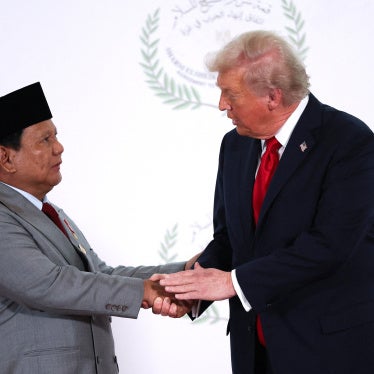The U.S. Supreme Court should overturn a lower court decision allowing the Justice Department to keep secret the names of over 1,000 people arrested in the United States following the September 11 attacks, Human Rights Watch said today.
"The use of secret arrests is a matter of tremendous importance for human rights in the United States and around the world," said Wendy Patten, U. S. Advocacy Director for Human Rights Watch. "Given the Justice Department's refusal to release the names of the detainees, it is up to the Supreme Court to declare that secret arrests have no place in a democracy."
Human Rights Watch and other advocacy groups sought the release of the names of hundreds of people arrested on immigration and material-witness warrants in the aftermath of the September 11 attacks. The groups filed their request with the Department of Justice under the Freedom of Information Act (FOIA) in October 2001. The Justice Department denied that request, and plaintiffs filed suit.
Yesterday, 21 co-plaintiffs asked the U.S. Supreme Court to review a June decision by the Court of Appeals for the District of Columbia Circuit, ruling that the Justice Department did not have to release the names or other information requested. In a split decision, the appeals court held that all of the information sought was statutorily exempt from disclosure because it was information compiled for law enforcement purposes, and disclosure "could reasonably be expected to interfere with enforcement proceedings."
Plaintiffs in the lawsuit, Center for National Security Studies v. Ashcroft, are contesting that decision and are urging the Supreme Court to hear the case both on FOIA and First Amendment grounds. At stake is the public's right to know what actions the government has taken-a guarantee of openness and accountability that is all the more important when the government action involves deprivation of liberty. By cloaking its arrest powers in secrecy, the Bush Administration has prevented the public from judging whether those powers were properly exercised or widely abused.
There is mounting evidence that the rights of hundreds of non-citizens were abused in the aftermath of September 11. In August 2002, Human Rights Watch released a 95-page report, entitled Presumption of Guilt, that documents cases of prolonged detention without charge, denial of access to release on bond, interference with the right to counsel, and unduly harsh conditions of confinement. In June 2003, the Justice Department's Inspector General issued a 198-page report with the results of its internal investigation into the treatment of the September 11 detainees held on immigration charges. The Inspector General's report confirmed abuses previously reported by Human Rights Watch, and also identified a pattern of physical and verbal abuse by some correctional staff at a federally run facility in Brooklyn, New York.
"The blanket of secrecy surrounding these detentions has contributed to these abuses," said Patten. "We urge the Supreme Court to hear this appeal to resolve important constitutional and statutory questions and, in turn, protect the most basic of rights."
International observers will be watching this case closely. Over the past two years, numerous governments throughout the world have enacted laws that unduly expand government powers of detention and surveillance. Some governments have pointed to the erosion of civil liberties in the United States after September 11 to deflect criticism of their own rights abuses.







